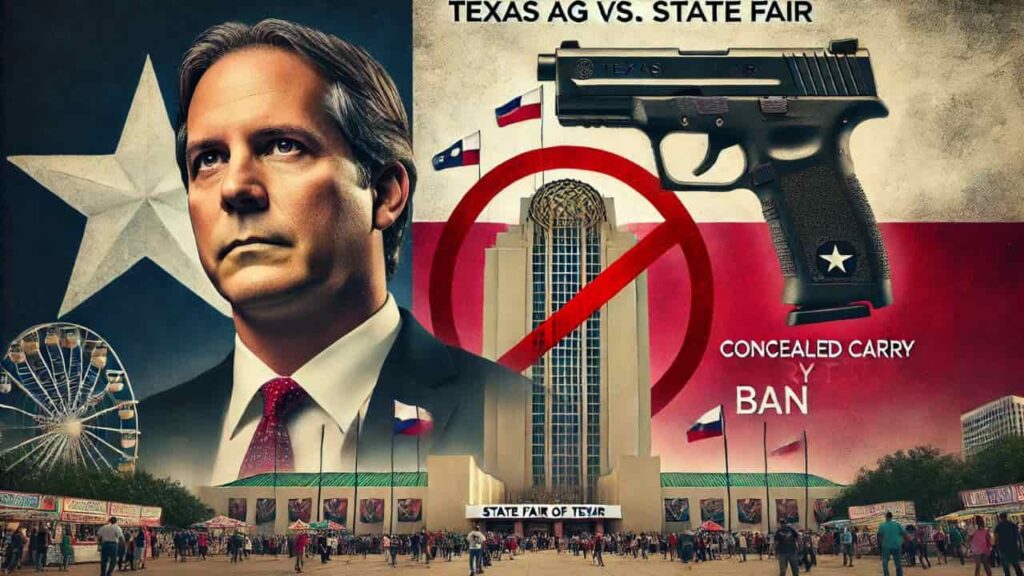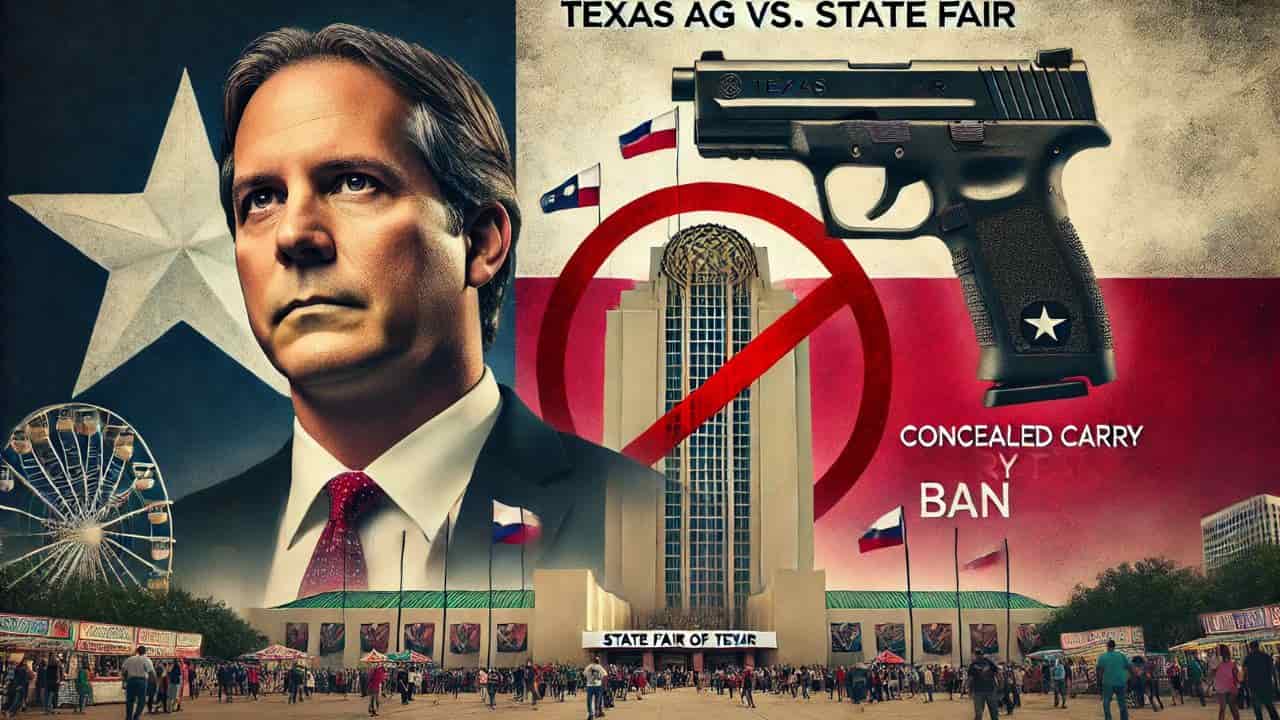Ken Paxton, Texas State Fair, concealed carry ban, Dallas gun laws, Second Amendment rights, Texas gun control, State Fair of Texas, Fair Park lawsuit, Texas Attorney General, gun rights vs. public safety
Explore the legal and political conflict between Texas Attorney General Ken Paxton and the city of Dallas over the State Fair of Texas’ concealed carry ban. This article delves into the implications for gun rights, public safety, and the future of similar events in Texas.

Texas AG Ken Paxton Threatens Legal Action Over State Fair of Texas’ Concealed Carry Ban
In a move that has ignited significant controversy, Texas Attorney General Ken Paxton has threatened to sue the city of Dallas over the State Fair of Texas’ recent decision to ban concealed carry firearms on its fairgrounds. The decision, made by the State Fair’s organizers, has stirred debate on both sides of the gun control issue, highlighting the ongoing tension between public safety concerns and Second Amendment rights in Texas.
The Decision to Ban Concealed Carry at the State Fair
The State Fair of Texas, a long-standing and beloved event held annually in Dallas, announced its new firearms policy last week. The policy prohibits all guns on the fairgrounds, with the exception of those carried by retired or active peace officers. The decision was prompted by a shooting at the 2023 State Fair that left three people injured, and the fair’s organizers cited the need to ensure a safe and family-friendly environment as the primary reason for the ban.
The decision was not made in isolation. The State Fair of Texas referenced similar policies at other major Texas events, such as the Houston Livestock Show and Rodeo, Rodeo Austin, and the San Antonio Livestock Show and Rodeo, which also ban firearms to enhance public safety. Karissa Condoianis, a representative of the State Fair of Texas, emphasized that while the fair respects people’s rights, the ban is a necessary measure to create a safer atmosphere for families attending the event.
The Backlash from Lawmakers and Gun Rights Advocates
The new policy, however, has been met with significant opposition from lawmakers and gun rights advocates. On Monday, 70 Texas lawmakers signed an open letter to the State Fair’s Board of Directors, urging them to reverse the decision. These lawmakers argue that law-abiding citizens who have undergone training and obtained concealed carry licenses should be allowed to defend themselves if necessary. Texas State Representative Frederick Frazier of McKinney, one of the signatories, expressed concerns that the ban could leave citizens vulnerable in the event of an emergency.
The argument put forth by these lawmakers hinges on the belief that trained and licensed individuals can serve as a first line of defense in situations where law enforcement may not be immediately available. This perspective is rooted in the broader debate over gun control in Texas, where many view the right to carry firearms as fundamental to personal freedom and safety.
Attorney General Ken Paxton’s Legal Threat
On Wednesday, Attorney General Ken Paxton escalated the situation by issuing a formal warning to the city of Dallas. In his letter, Paxton argued that the State Fair’s firearms ban infringes upon the rights of Texas gun owners, particularly because Fair Park, where the State Fair is held, is government-owned property. According to Paxton, Texas law clearly states that licensed individuals cannot be prevented from carrying a firearm on property owned or leased by the government unless specifically prohibited by state statute.
Paxton’s letter concluded with a clear ultimatum: the city of Dallas has 15 days to address the issue, or face legal action. This threat of a lawsuit underscores the seriousness with which Paxton views the matter and reflects his commitment to defending the rights of Texas gun owners.
The Legal and Political Implications
The conflict between the State Fair’s organizers, the city of Dallas, and the Texas Attorney General’s office raises several important legal and political questions. At the heart of the issue is the interpretation of Texas law regarding firearms on government-owned property. Paxton’s argument is based on the premise that the State Fair, despite being a private, not-for-profit organization, operates on government-leased land and therefore cannot impose a firearms ban without violating state law.
This interpretation, if upheld, could have far-reaching implications for other events and venues across Texas that have implemented similar bans. It also highlights the ongoing tension between local governance and state oversight in matters of public safety and gun rights.
The political implications are equally significant. The debate over gun control is a highly charged issue in Texas, a state with a strong tradition of gun ownership and a deeply ingrained belief in the right to bear arms. Paxton’s actions are likely to resonate with his base of supporters who prioritize Second Amendment rights, but they could also alienate those who are more concerned with public safety and the prevention of gun violence.
The Response from the State Fair of Texas
In response to Paxton’s letter, the State Fair of Texas issued a statement acknowledging the Attorney General’s concerns but distancing itself from the legal dispute. The fair’s organizers noted that they had not yet communicated with the city of Dallas about the matter but expressed their willingness to cooperate as needed. The statement also clarified that the State Fair is a private organization that operates under a long-term lease agreement with the city for the use of Fair Park.
By framing the issue as one that involves the city’s relationship with the State Fair, the organizers are attempting to navigate the legal and political complexities of the situation while maintaining their focus on public safety. However, their position may be difficult to sustain if the legal battle between Paxton and the city of Dallas escalates.
The Broader Debate Over Gun Control in Texas
The controversy surrounding the State Fair of Texas’ firearms ban is reflective of the broader debate over gun control in the state. Texas has some of the most permissive gun laws in the country, and efforts to impose restrictions, even in the name of public safety, are often met with fierce resistance from gun rights advocates and lawmakers.
At the same time, incidents of gun violence, such as the 2023 shooting at the State Fair, have prompted calls for stricter regulations to protect public safety. The challenge for policymakers is finding a balance between respecting Second Amendment rights and addressing the legitimate concerns of those who fear the consequences of unrestricted gun access.
This debate is further complicated by the fact that different regions of Texas have different attitudes towards gun control. Urban areas like Dallas may be more inclined to support restrictions, while rural areas tend to prioritize gun rights. The State Fair of Texas, which draws visitors from across the state, is caught in the middle of this cultural and political divide.
Potential Outcomes and Future Developments
As the deadline set by Attorney General Paxton approaches, the city of Dallas and the State Fair of Texas face difficult choices. If the city decides to challenge Paxton’s interpretation of the law, the dispute could end up in court, setting a legal precedent for similar cases in the future. Alternatively, the city could choose to comply with Paxton’s demands, which would likely lead to the reversal of the State Fair’s firearms ban.
In either case, the outcome will have significant implications for the future of gun control policies in Texas. A legal victory for Paxton could embolden other challenges to firearms restrictions at public events and venues, while a defeat could strengthen the position of those advocating for stricter gun control measures.
For the State Fair of Texas, the stakes are high. The fair’s reputation as a family-friendly event is on the line, and the organizers must weigh the potential backlash from gun rights advocates against the need to ensure public safety. The fair’s decision could also influence the policies of other events and organizations across the state that are grappling with similar issues.
Conclusion
The clash between Texas Attorney General Ken Paxton and the city of Dallas over the State Fair of Texas’ concealed carry ban is a microcosm of the broader debate over gun control in the state. As the legal and political battle unfolds, it will serve as a test of Texas’ commitment to balancing Second Amendment rights with the need to protect public safety at large events.
The outcome of this dispute will likely have far-reaching consequences, not only for the State Fair of Texas but for other public events and venues across the state. As both sides prepare for a potential court battle, the eyes of Texas—and the nation—will be watching closely to see how this contentious issue is resolved.
Read More
- Skai Jackson Arrested for Domestic Battery The Shocking Details and Whats Next
- Why Joel Embiid Chose to Play for Team USA in the 2024 Paris Olympics
- Sarah Hildebrandt’s Gold Win Follows Opponent’s Disqualification
- Cate Blanchett Reveals Surprising Pay for Lord of the Rings Role A Hollywood Pay Equity Insight
